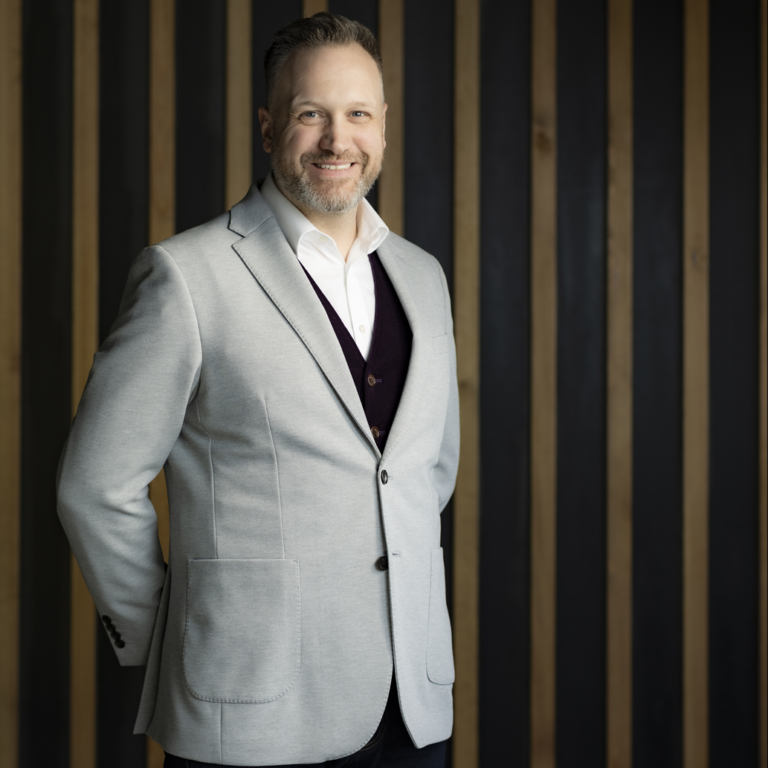PERRY TAKE US BACK TO YOUR EARLY LIFE AND HOW YOU FOUND THE PATH TO A CAREER IN HR.
I was born in Norwich, but spent the first part of my childhood in Reading in Berkshire, until my parents separated. Then, along with my sister, we moved to Norwich with Mum, where we had a great family network around us and the area is really is central to the family. My Grandfather was a former Lord Mayor of the city and even has a street named after him! Early years included travelling back and forth between parents – Mum in Norwich and Dad in Reading – until my Father retired to Cyprus. This coincided with my sixth-form years and I started to become disengaged and focus my efforts elsewhere. I was in a couple of bands – there was a good deal of partying – and my attitude was poor and my schoolwork definitely suffered. So, when I considered as a career. I then applied for a job at NatWest and looking back now, my lack of preparation and research for the interview was obvious, but the HR Manager saw something in me that, at the time, I didn’t see at all in myself and offered me a job as a banking cashier. Over the next couple of years, I worked my way up and gained some experience in people management, but eventually decided I didn’t want a career in banking. Frustrated, I realised I was eliminating what I didn’t want to do, but without determining what I did want to do.
At the time, I had a girlfriend who was set to go to university, but at the last minute, the course that she was due to study was cancelled and she needed to f ind an alternative. So, as I had a car, I drove her around various unis and it was during this road trip that something clicked and I thought that I should really go to university, but I had no immediate idea of what to study. Giving it some thought, I decided that I should study subjects that had kept my interest in the years since leaving education, which were mainly reading and film. I decided to look at English literature and film studies in a number of universities and was accepted at the University of Kent in Canterbury as a “mature student” at 21 years old. This proved to be the most pivotal decision I’ve ever made, because it opened me up to new possibilities. Alongside my studies, I joined the American football team and this was how I met Helen, my now wife, who was a cheerleader for the team. It was the discipline needed to be part of the American football team that really changed me as a person and made me more aware of myself and the importance of teamwork, trust, work ethic and not letting people down. I made some lifelong friends and it was such a positive experience for me and really shaped who I would become as a person. It also nearly shaped my career path! I remember discussing an assignment with a housemate on the same course as me and she told me that she thought I would be a good teacher. I thought about that and it really resonated with me – I did enjoy tutoring people – and so I set my mind on continuing on to do a master’s in film, then a PhD, with a view to go into lecturing. That was the plan, so I stayed on for my master’s and then applied for a PhD in Film at the UEA in Norwich. At this point, a career in HR wasn’t something I had ever considered, but a Christmas temp job at a department store was about to change that.
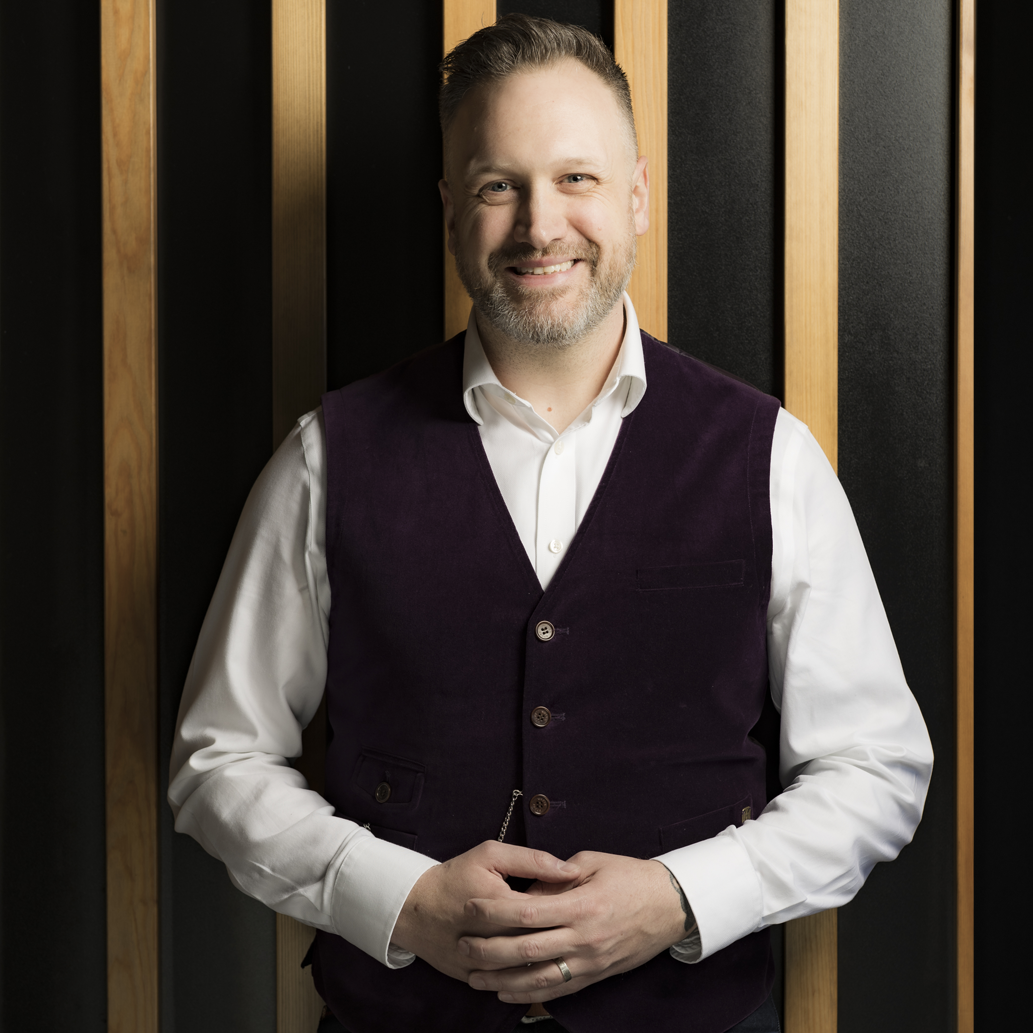
THE CHALLENGES, SETBACKS AND OPPORTUNITIES THAT COME ALONG REALLY ARE THE CLICHE SLIDING DOOR MOMENTS, TELL US ABOUT THE NEXT STAGE OF YOUR JOURNEY.
I studied my PhD part-time and had to work, as my place wasn’t funded. This was post-financial crash and so I took a job in retail as a Christmas temp at Jarrolds Department Store and also worked part-time in a bar. Helen was living and working in London whilst I was in Norwich, so we conducted a long distance relationship for two years, before she came up to Norwich and we moved in together. The bar closed for good and I was offered a permanent role at the department store. I moved into the customer services team and the job came with bits and pieces of HR work and the more I did the more they gave me, and I really enjoyed it. Eventually, I was involved in recruitment, appraisals and payroll, gaining experience in a myriad of HR fields. So, there was what I would describe as this slow and unplanned drift towards being an HR practitioner, but I was still studying for a doctorate in film. At this point, I had been in further education for six years and I saw a lot of my friends marrying, having children and buying houses, while we were living in my Mum’s spare room, working minimum wage jobs and trying to save some money. Then with the unexpected love of working in HR, the dream of being a lecturer in film faded away and I withdrew from my studies. Sadly, there wasn’t the budget at the store for me to be in the HR team full-time and after a couple of secondments in sales roles, I left for a job in a local art gallery. T his was when I realised that I am not a salesperson – I really struggled in that role – and I hit a wall with my mental health. Looking back afterwards, I know it was a period of depression, but I couldn’t see it at the time and it took the people closest to me to point out that I had really changed from my normal happy self and they helped me understand that I felt lost. I’d been treading water for so long and not making any real progress and I knew I had to leave the gallery and, although we really needed the income, Helen said that she would support me. I wrote my resignation letter there and then, with a firm commitment of finding a way into HR.
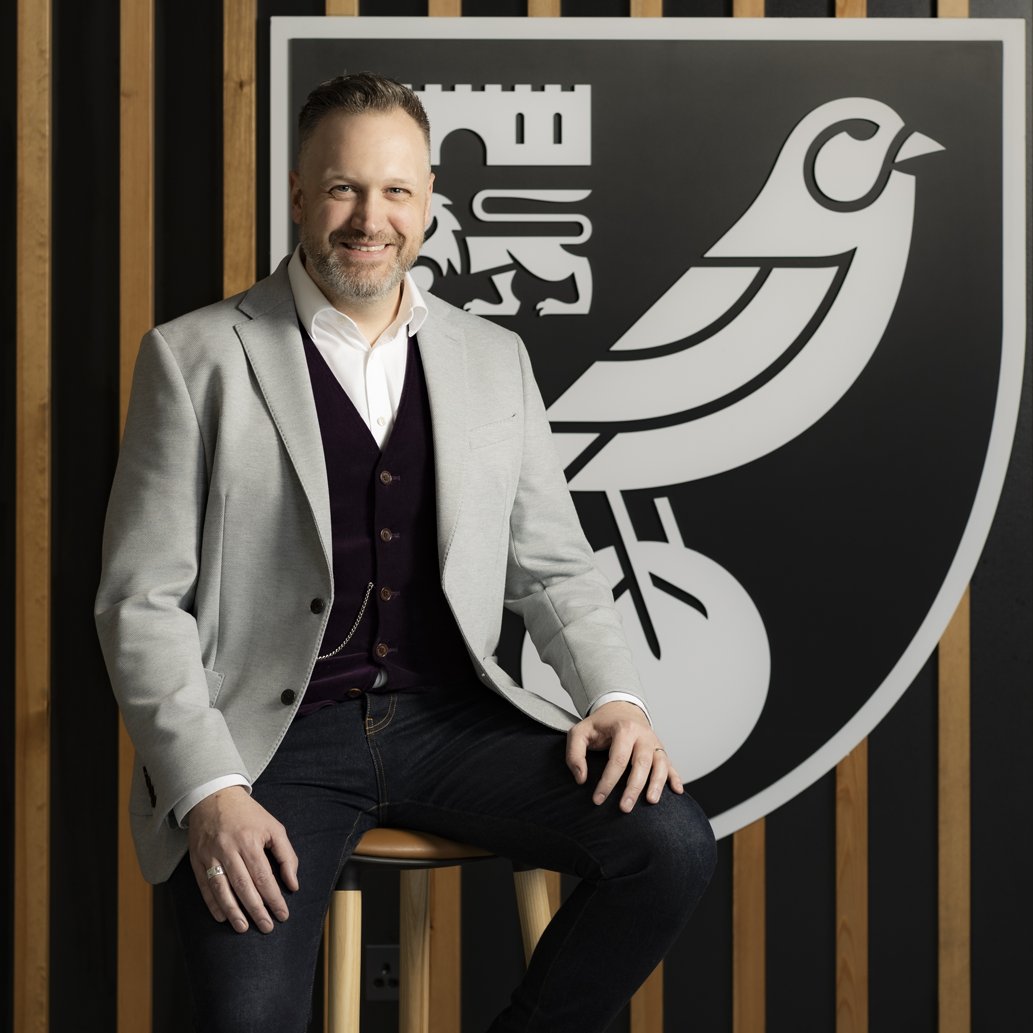
IT’S AT THIS POINT THE READERS WILL BE EXPECTING A DOOR OPENING, REVEALING A SUNLIT HINTERLAND OF OPPORTUNITY. IS THAT WHAT HAPPENED?
Not exactly, I was canvasing all of the recruitment agencies in driving distance, for HR work, but not many of them were able to help me. Then I came across an agency called Pure and I spoke to a recruiter there and at first it felt like the usual process that I’d gone through before. But what was different here was that she listened… and listened… and when I had finished, she assured me they could help me focus on a career in HR. Pure contacted me and said they had a couple of temp jobs available and I said I would work for whomever wanted me, so long as it was an opportunity in an HR function. I was sent to a small town about half an hour outside of Norwich for the following Monday, where I met the newly-appointed HR Manager, who accepted me into my first proper dedicated HR admin role for the Flagship Group. A couple of months into the job, friends and family started to mention that my whole demeanour had changed and I was “back to being the old Perry again” and it was all down to working with great people and a growing passion for HR and all it represented as an opportunity to add value.
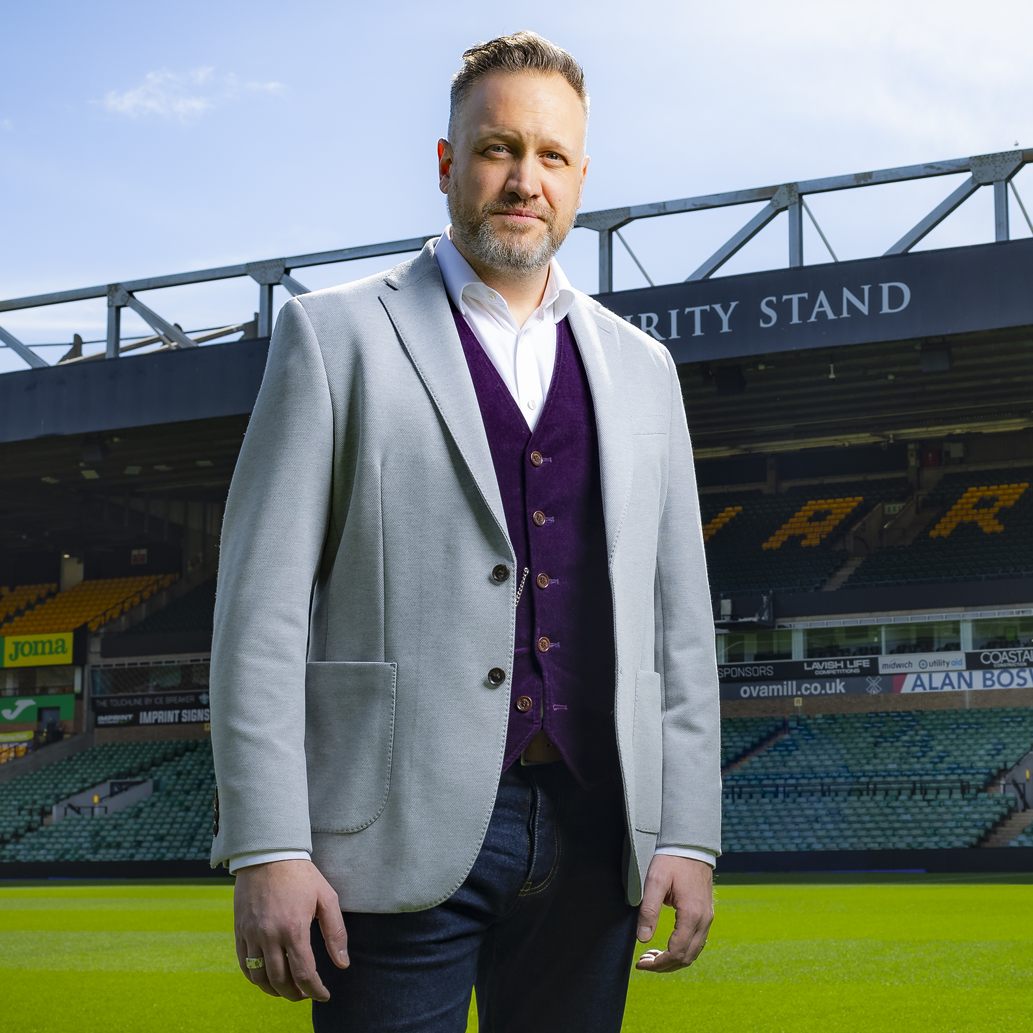
IT TAKES A LOT OF COURAGE TO SHOW SUCH CANDOUR FOR SOMETHING THAT IS SO PERSONAL. WHAT DID YOU LEARN ABOUT YOUR OWN MENTAL HEALTH JOURNEY AND HOW HAS THIS INFORMED YOU IN THE TIME SINCE?
I’m very alert to others bottling things up, trying to tough things out and I do my best to make sure that people feel safe and confident to talk. Everyone’s mental health can suffer at some point in their lives and when we do, it’s important that we can put a hand up and say: “I’m struggling here and I could do with some help!” Historically, we know men are particularly bad at this and the statistic that suicide is the biggest killer of men under 50 sounds an ominous, tolling bell. The importance of being mental health aware – both personally and as an HR practitioner with responsibility for people – is something I wholly embrace. I think it’s important to pass on your experiences and I have delivered presentations about my career journey to schools and colleges, where I describe the value of mental health awareness and am open about my own story. I’m also an advocate that you don’t have to go to university to have a great career, just find something that you love and enjoy. Sure, I took the long route, but all my experiences – good and bad – have led to where I am now. For me, a successful career is about gaining experience at every chance, enjoying what you’re doing and adding value. I’m always curious and interested and want to learn and I genuinely believe that the more you put in, the more you get out. Going back to my time at Flagship, it was part of a start-up arm of the group, so the HR strategy was yet to be built. I remember the HR Manager saying how there was nothing much established in the way of infrastructure and that it was going to be hectic, demanding and not always pleasant – not exactly selling it really. Strangely though, I wasn’t daunted and I saw this as a fantastic learning opportunity, despite my relative lack of experience. I learned on the job and was able to support new policies and procedures and make some real progress. For example, the start-up had merged multiple companies so that gave me a crash course in TUPE. When you think I initially went in as a temp to tidy up a bit of employee data, I soon found myself a permanent part of a much bigger operation and part of a fantastic team. I loved it and it also gave me something else, because the whole company was being created around a culture of continuous improvement and I was embedding in every process I helped develop. This became a foundational aspect of my own HR management and one of the guiding principles of my career, which I still apply to my work and my team to this day.
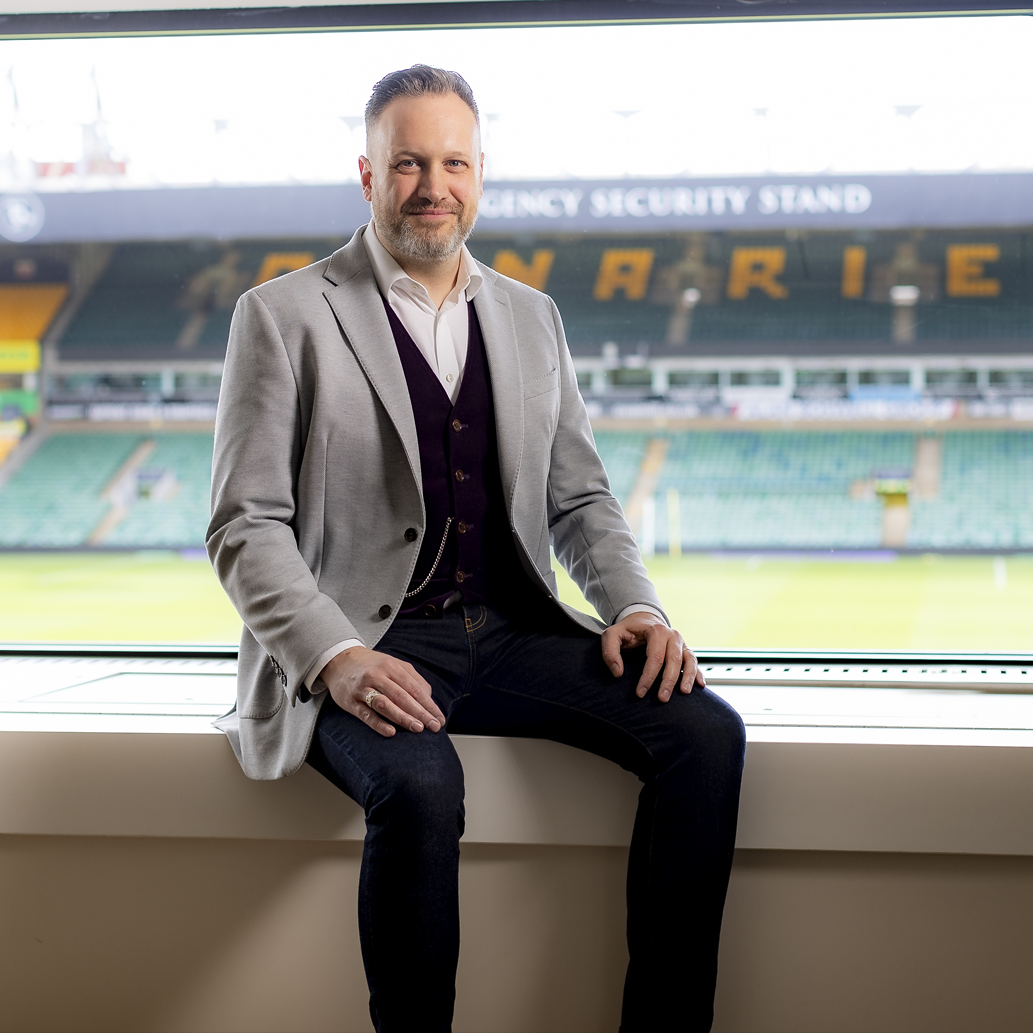
IT MUST HAVE BEEN ENCOURAGING TO REALLY START TO EXPLORE THE MORE STRATEGIC ELEMENTS OF HR WHAT HAPPENED NEXT IN YOUR JOURNEY?
My time at Flagship was great, but eventually I wanted to progress my career and the opportunity was not there, so I moved on. I briefly worked for a large commercial services firm, but it was a massive organisation and felt very impersonal. There was no desire to look at improving processing and considering double loop solutions – they were happy to fix the symptom, not the actual problem – and given my background in continuous improvement, I knew that would mean a huge part of my skillset would not be used. I quickly concluded that wasn’t the right environment for me and I moved on shortly after and joined a private healthcare company, as a senior HR advisor. This was much more my speed – the previous iteration of the HR function had been hugely risk-averse – and I was brought in to support a new manager in rebuilding the function from the ground up. It was similar work to my time at Flagship and was just as rewarding, then about six months later, the HR Manager who hired me – and had been working through an agency – left their post. I was summarily called into the CEO’s office and asked if I could manage the HR team. I barely needed to consider the question and quickly said “yes!” Even though I’d never been in a top HR job before, I believe in embracing opportunities when they arise and I had the confidence that my wide-ranging work experience outside of HR would complement the learning journey ahead of me. So, with a small team, we embarked on a pretty ambitious change management programme, embedded new processes and policies which stabilised and brought in efficiencies that were well appreciated across the organisation. I realised that making sure that everyone feels involved and that their opinions and ideas are being taken on board, is the best way to bring people along on the journey. Then I had a call out of the blue from my former line manager at Flagship, who had moved onto Blue Sky Leisure, a hospitality and tourism company with coastal holiday parks and American Diner-themed restaurants. She asked if I would be interested in joining to eventually cover for her impending maternity leave. The timing felt right, so I was on the move and once again started work in a business that was running on loyalty and historic practice, as opposed to structured HR. T his was another opportunity to build better from scratch – within two years this was implemented – then at the start of 2020, the company sold half of its business portfolio. It felt like I had reached a crossroads which presented an opportunity for me to start a consultancy business and work for myself. But this was March 2020 and like everyone else, my plans changed due to COVID and so I put that on the back burner to support Blue Sky, developing furlough plans, drafting up work-from-home policies and, given how hard the hospitality industry was hit during the pandemic, implementing longer-term workforce planning. We managed to successfully work through the pandemic and had adapted to reopen, but the business had changed dramatically in that time and I wasn’t as engaged as I had been. I had two choices, revive my plans to start up the consultancy or find a new job and that was when I applied for a senior HR role at Norwich City Football Club.
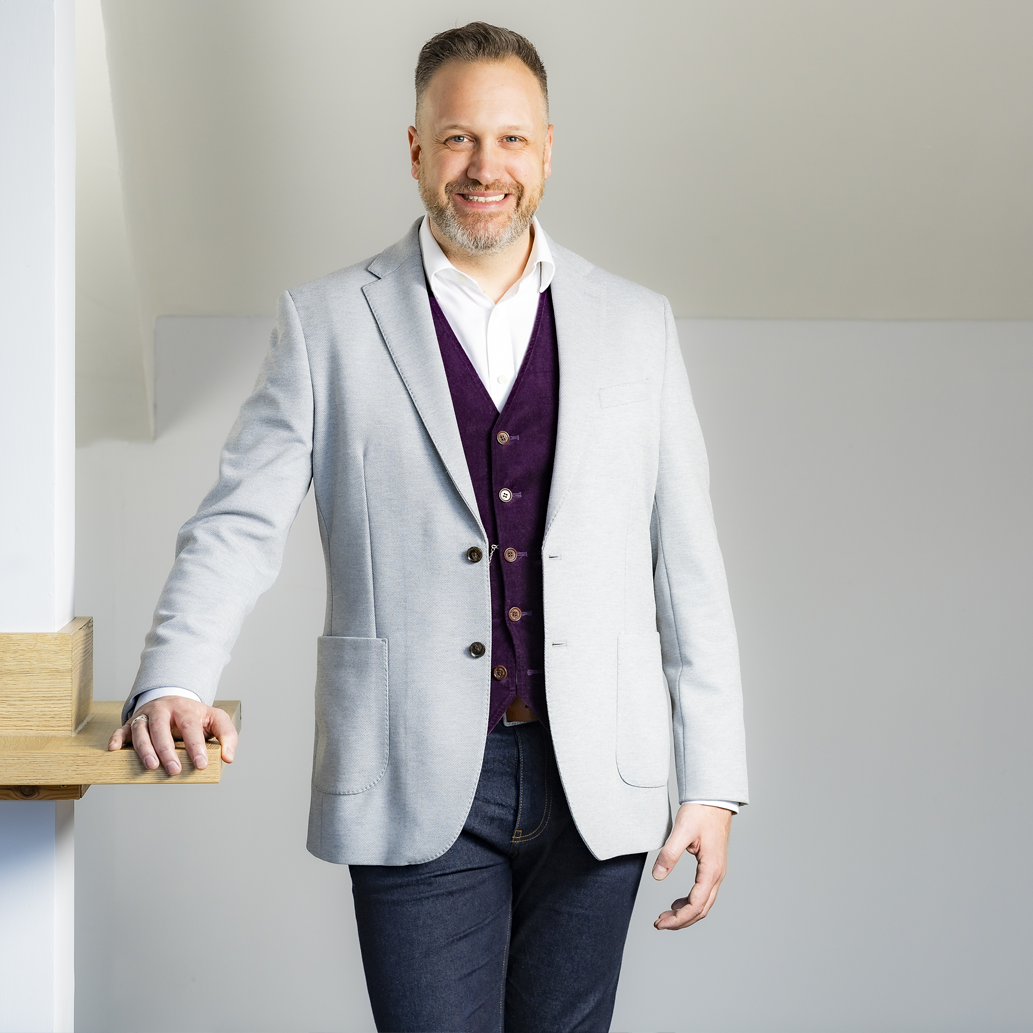
YOUR CAREER PATH HAS BEEN NOTHING IF NOT VARIED, BUT THAT IS OFTEN WHERE IMPORTANT LIFE EXPERIENCES DRIVE PROGRESS AND UNDERSTANDING. TELL US ABOUT NORWICH CITY FC AND JOINING THE CLUB.
I joined the Canaries in the immediate aftermath of a dominant season that had seen the club promoted to the Premier League. Internally, the HR team had just undergone significant change, including the departure of the previous HR Manager. I could feel the ambition and eagerness pulsing through the club, but it needed a future-facing HR team to support it, as it prepared for a hectic season ahead and all of the opportunities that would ensue. When I joined the club, I would be the first to admit that I wasn’t a football fan, but there is such a range of departments across the club that a lot of your work is not focused on football. You come to understand that football is the end product – and the work of every department ultimately supports and improves that – but in many ways, the club is like any other business. The permanent headcount is about 350, but on a match day, with our casual workforce, this can rise to 1,500 people, all deployed across the stadium in various areas of operation. Considering the dynamism of the club and its exciting position towards the top tier of English football – along with being a complex and multifaceted organisation – the HR systems in place were either basic or unestablished. However, before we even considered embedding process, there were clear signs across the whole club that HR had work to do, to build relationships and gain trust, especially at our training ground, which is all about high performance and optimum output. T hen, just as I was establishing myself and the HR team was being rebuilt, my manager announced she was leaving. I had worked at senior HR levels previously and had taken a step back for this role and I immediately put myself forward for the Head of HR and was pleased to hear that the club already had me in mind for the role. That said, I took some time to consider what the objectives were and I started to devise a plan and build a structure for the HR team. All along, I have had a lot of freedom to build and recruit as I see fit and we’ve f illed that structure with some great people, who all have autonomy in their roles, own their workloads and are confident to make suggestions to improve processes. As for me, all the experience I had gained in the varied sectors was giving me a good sense of how to engage with my team and the wider staff across all areas of operation. I really enjoy the people development aspect of my role and I take every opportunity to ensure each member of my team understands what they are doing and why.
YOU’VE SAID THAT IN MANY WAYS A FOOTBALL CLUB IS JUST LIKE ANY OTHER BUSINESS, BUT IN MANY OTHER WAYS, IT ISN'T. SO, GIVE US AN IDEA OF THAT RARIFIED ATMOSPHERE.
On a human level, the dynamics in a club like this are electric, emotional and truly compelling. Where Premier League mainstays like Manchester United and Liverpool have a massive international following, most of our fans are local and make up the community that we serve. There is a special atmosphere at Carrow Road and we are always working to be a truly inclusive club and we have a wonderful stadium which comes alive on match day, particularly for the East Anglian derby with our rivals Ipswich Town. We know success on the pitch is our primary focus and everything is channeled into helping achieve those results. The 2023/24 season in the Championship has been incredibly competitive and a roller coaster ride to the end. But win, lose or draw – and whether in the Premier League or Championship – what this club means to the fans and this region cannot be understated. At its heart, this is a family club in every sense and we care about this beautiful part of the world and the people that live here and we are involved and support many different and great causes. We’re a magnet for the people, businesses and charities in our area and, as such, a great platform for some very important causes. Over the last few years, we have identified that the average age of our male season ticket holders mirrors the highest risk age group for male suicide. So, this season, in celebration of World Mental Health Day, we produced a film highlighting the risks and signs when someone is struggling. The reach and impact of this film has been significant and we’ve had 117 million views of the f ilm worldwide and won multiple industry awards. That’s great and if just one person reaches out and seeks help, then that film has achieved an incredible result. We embrace the platform we have to positively impact our community and that drives a unique atmosphere about this club that even fans from competing teams comment upon when we host a match. For me, that capacity to influence those around us and beyond is a responsibility that must be capitalised upon. Our Community Sports Foundation, which is our charitable arm, does incredible work out in our community and combined, these outreach elements make us a hugely compelling brand. There is immense pride in this football club and it’s an absolute privilege to be a significant part of this community. We can look back and be proud of our legacy, but we can also see the massive potential in the future and that is a good place to be. Ultimately, we talk about stewardship, because when our time and work is done, Norwich City FC remains the constant and will be just as valid and essential to the next generation as it is to the current one. We are all working towards the club’s infinite purpose which is, “to make our football club and community better today than it was yesterday”.
FROM THE PLAYERS THAT GIVE THEIR ALL FOR 90 MINUTES ON THE PITCH, TO THE STAFF IN CATERING, TO THE PEOPLE THAT WORK THE PITCH, IT MUST BE AN EXTRAORDINARY EXPERIENCE ON MATCH DAY.
When Carrow Road is in full voice singing “On the ball, city!” as the players kick off, it’s a pretty special place to be, and everyone contributes to that atmosphere and success. Of course, performance on the pitch is the key indicator of overall success in a season, but we also ensure every aspect of how our people perform contributes to that success is acknowledged. We hold end-of-season reviews, which are collaborative and comprehensive, ensuring every employee knows how their work contributes to the performance of the team. The targets of the club – for example, where we expect to finish in the table – are related to individual performance, so that everybody feels part of the collective goal. Winning is the objective and infinite purpose. But it’s about balancing passion with pragmatism and collective responsibility, not the blame game. During my time at this club, I would say my proudest moment is helping to make that connection, together with some fantastic input from many people on that journey, which has resulted in significant awareness, improvement and positivity.
YET IN THE WORLD FOOTBALL, VERY FEW PLAYERS IN THE MEN’S PROFESSIONAL GAME HAVE FELT COMFORTABLE TO COME OUT AS GAY. IN 2024, THAT IS A SAD INDICTMENT.
My role as Head of HR also includes responsibility for EDI across the club, developing and leading our inclusion strategy of making Norwich City “A Home for Everyone”. EDI has become embedded within the values and culture of our organisation but, while we have a lot of momentum and progress has been made, there is still much to do. This is a dynamic and complex area – and there are divisive views across society – but EDI is more visible now than ever before and it’s important that we make space for discussions to be had out in the open, even if not everyone agrees. I believe that’s how a civilized society makes the right decisions, especially when the hard yards are unavoidable. That we’re having discussions on these issues – such as transgender access to single sex toilets – is progress, as it is a conversation that would not have happened before. We’re working to change the narrative internally on many platforms and levels, including working groups and standing agenda items – at SLT and Board meetings – as well externally. Along with mental health and wellbeing, this has become an integral part of our strategy in all aspects of the club and in our marketing and comms strategies.
PERRY, IT’S BEEN QUITE A CAREER AND CERTAINLY UNCONVENTIONAL. HOW WOULD YOU ENCAPSULATE YOUR EXPERIENCES AND WHAT IS YOUR KEY HOPES AND OBJECTIVES FOR THE FUTURE?
When I look back, I realise that I’ve been on quite a journey. I’ve learned so much from the experiences I’ve had and the people I have met, worked with and been influenced by, both the good and the bad. I’m so grateful that I pursued and embraced my career in HR, because people are so rewarding – incredible, fascinating, complex and at times frustrating – but never boring. This football club has immense heart in a sport that has worldwide impact and influence. I believe there’s limitless opportunities to make significant improvements to people and communities, both locally and across the globe. Personally, this role in HR means something very special to me. It has taught me how to exist between best fit and best practice, how to bend, but not break and the importance of strong values and culture. But most importantly it’s taught me patience, understanding and pragmatism. I see my objective as not just being an agent of change, but a driving force in providing people with the knowledge, tools, capabilities – and, most importantly, opportunities – to make those changes. Above all, I’m immensely grateful for all the highs and lows along the road and the privileges I’ve been granted in being a part of this fantastic football club.
FOR FURTHER INFO WWW.CANARIES.CO.UK
